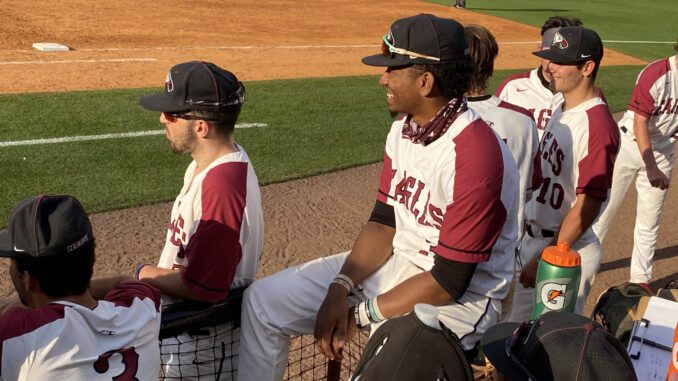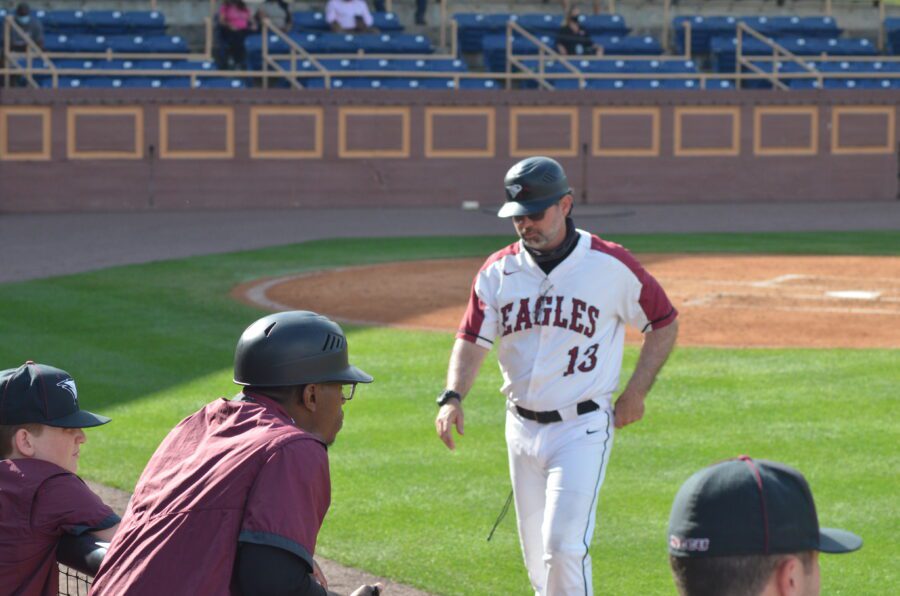
DURHAM — NC Central baseball coach Jim Koerner didn’t think twice when he was called into athletic director Ingrid Wicker McCree’s office on Feb. 11, eight days before his team’s season-opening game against Army.
“I thought I was being called in for a budget meeting, talking about taking two buses on road trips because of COVID and some logistical things,” he said.
Koerner was right about one thing, the meeting was about budgetary matters. Just not the kind he was expecting.
McCree informed the 10th-year coach that his program would be discontinued after the current season because of an “increase in athletic expenditures during the past four years and the impact of the COVID-19 pandemic on revenue opportunities.”
The news hit Koerner like a line drive between the eyes. But as painful as it was to hear, telling his players was exponentially worse.
“When we found out, we were all in shock,” said Chet Sikes, a freshman catcher from Trinity. “That was the last thing we were expecting when Coach called us in.”
There was plenty of disappointment to go around, along with a little bit of anger considering the timing of the decision came so close to the start of the season that players were unable to consider other options.

But those emotions quickly turned to motivation as the Eagles decided to channel their frustration through their play on the field.
They started quickly by sweeping Army in their opening series and currently stand at 12-11 overall (4-4 Mid-Eastern Athletic Conference) after splitting four games with in-state rival NC A&T last weekend.
“We all kind of talked and knew that we can’t think about the (program) being done,” Sikes said. “We can’t worry about that right now. We just need to focus on the season we have together with each other, win as many games as we can and enjoy it while it’s here.”
So far, they’ve managed to do just that.
Instead of letting its lame-duck status follow it around like the black clouds that forced the suspension of Friday’s game against the Aggies — which eventually turned into a 4-1 win when it was finished on Saturday — NCCU has done its best to turn the negative into as much of a positive as possible.
It’s noticeable in the good-natured banter that goes on between the players before a game and in the dugout, and in the way teammates rush to congratulate one other after a good play or a run is scored.
Rarely, if ever, is the imminent demise of the program mentioned.
That, said Koerner, is a testament to the leadership provided by the 16 upperclassmen on the roster.
“It’s given me a different perspective on this season,” the NCCU coach said. “Personally, I’ve probably had more fun coaching baseball this spring than I’ve had in a very, very long time.”
But the fun can’t last. With 20 regular season games remaining, the Eagles are about to turn the corner into the home stretch for the final time.
Once the last out is recorded, either in the MEAC Tournament or an NCAA regional, Koerner will become the director of player development for USA Baseball. His staff will be out of jobs and the players that decide not to finish their academic careers at NCCU — an option left open to them by the school’s administration — will have to find new places to play.
That will be challenging enough for those such as Sikes, who leads the team with a .338 average, junior outfielder Luis DeLeon with his four doubles, three triples, a home run and 18 RBI, or redshirt sophomore pitcher Ryan Miller. It will be even more difficult for teammates that have yet to crack the lineup.

“I feel bad for our younger guys,” said Miller, a Pennsylvania native who is 5-0 with a 2.25 ERA. “At the time we found out about our program being canceled, it was pretty rough news for them because they were all excited about their first college baseball season.”
The decision to drop baseball was made by a task force, commissioned by the historically black university at the start of the current academic year, that determined “the current funding model for athletics is not sustainable.”
Factors such as roster size, number of games, facility rental fees and other operational expenses — as well as Title IX considerations — led to the decision.
“I empathize with our baseball student-athletes, parents and families,” Wicker McCree said in a statement. “There is never the right time to make an announcement such as this, however, this decision was made after a rigorous internal and external review of our long-term financial model.”
While there might not be a “right time” to make such an announcement, the mother of pitcher Austin Vernon said that the actual timing couldn’t have been worse.
“It’s beyond disappointing because he has a chance to be a draft pick this year,” said Wendy Vernon, sitting behind home plate watching her son, a 6-foot-8, 265-pound junior, throw 94-95-mph fastballs on his way to a victory against A&T.
“If we’d have known something sooner, he could have gone through the transfer portal and played someplace where he could be seen more. Now, with the program closing down, it’s hard for (the scouts) to come in and watch him.”

Koerner said he understands the Vernons’ frustration but adds that if the decision had been made before the start of the spring semester, there probably wouldn’t have been enough players left to play this final season.
“The timing part is a Catch-22,” he said. “It would be great if we would have had some warning. Maybe we could have been more proactive as far as maybe coming up with some solutions or having more dialogue on what could or could not be done. But on the flip side, if they had said in the fall that we’re cutting the program after this year, we probably would have lost the majority of our team.”
There is still a chance that the program can be saved if, like Bowling Green last summer, enough private funding can be found. But with a price tag somewhere in the neighborhood of $3 million, it’s unlikely to happen.
Even a MEAC championship and a trip to the NCAA Tournament probably wouldn’t be enough to change anybody’s mind, though, as Miller suggested, accomplishing those goals would put a fitting exclamation point on a program that has won 20 or more games the past four completed seasons and had six players sign with major league teams — including two-time conference Player of the Year Corey Joyce.
“As a group, we all take pride in playing for the people that came before us because they laid the foundation for the program,” Miller said, noting that Koerner invites an NCCU alumnus to talk to the team before every home game. “There’s a lot of people out there that don’t believe in us, so to go out on top is our main focus right now. That would mean everything for us.”



